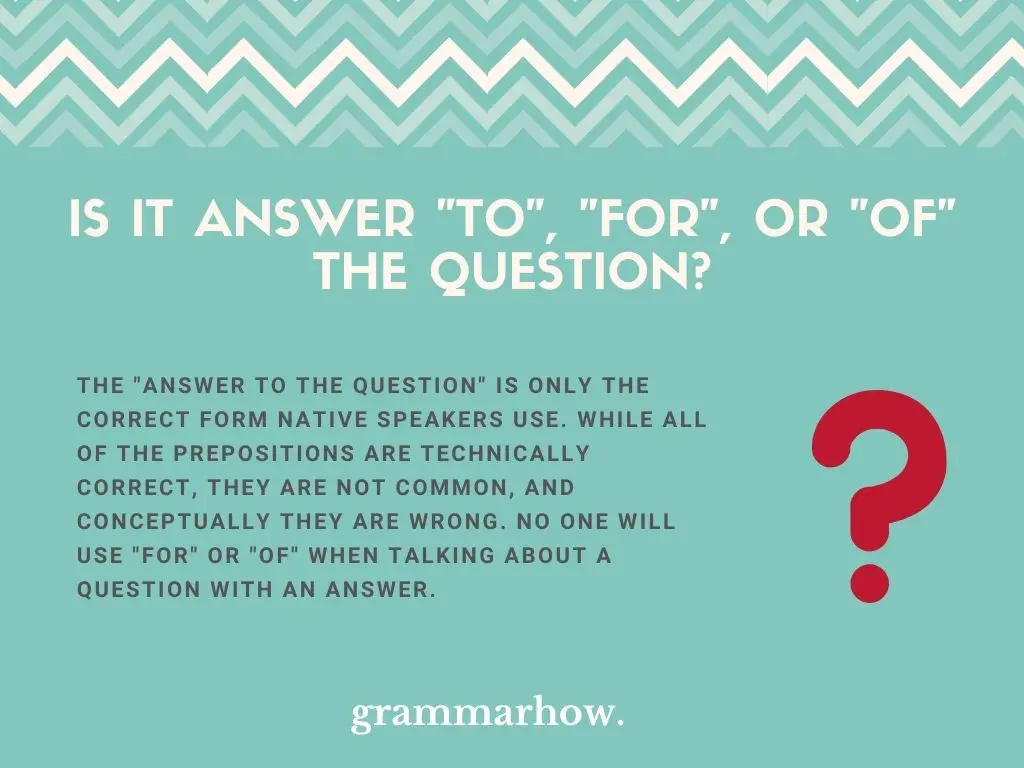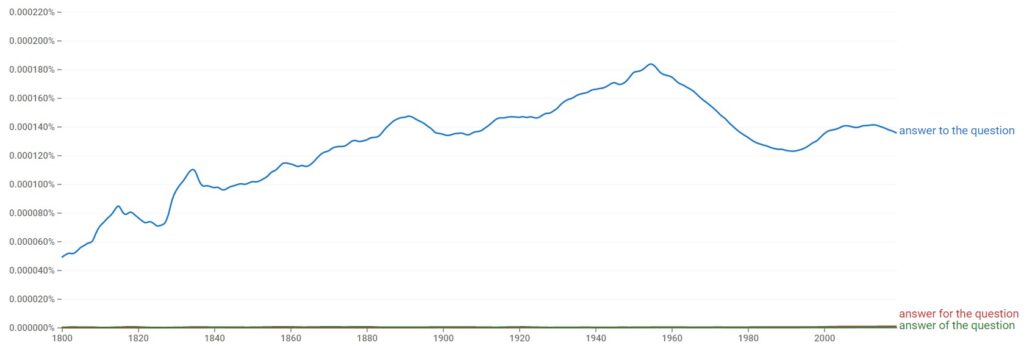When using prepositions, a lot of the rules we associate with them come down to context. Typically, we choose the most acceptable prepositions based on common usage. This article will look at the answer to, for, or of the question and which is correct.
Is It “Answer To The Question,” “Answer For The Question,” Or “Answer Of The Question”?
The “answer to the question” is only the correct form native speakers use. While all of the prepositions are technically correct, they are not common, and conceptually they are wrong. No one will use “for” or “of” when talking about a question with an answer.

There aren’t many things we can tell you about why we use one preposition over the other. Most of it comes down to time and knowledge. Many people base their writing on what is common and expected.
- What is the answer to the question?
- The answer to the question is 4.
As you can see, “to” is the correct preposition when both asking for an answer and providing said answer. “To” denotes an assigned thing in this form, and the answer is “assigned” to the question.
So, what makes “for” and “of” wrong? Well, it comes down to ownership.
Both “for” and “of” are prepositions that denote ownership. In simpler terms, they both mean that the question should “own” an answer. However, some questions have no answers, while others have multiple, so there are no cases where one strict “answer” can be “owned.”
How Prevalent Is The Use Of The Different Variations?
We have some statistics to share to help prove that one form is the only correct form. You’ll notice that only the “to” preposition is common in English from the below graph.
According to Google Ngram Viewer, only the “answer to the question” is correct. “Of” and “for” see almost no use, and they have historically never been used either.

- Correct: The answer to the question is simple.
- Incorrect: The answer of the question is profound.
- Incorrect: The answer for the question is tricky.
Is It Ever Correct To Use “Answer For The Question” And “Answer Of The Question”?
As we’ve said throughout the article so far, there seem to be no cases where “for” or “of” are correct.
You can simply refer to the graph in the previous section to see that no native writers use the two forms. They’re not just uncommon, though; they’re conceptually wrong.
Native speakers never use “answer of the question” because the preposition is incorrect for the meaning of the phrase. However, “answer for the question” is sometimes correct, depending on the context.
To help you understand the key problems with the preposition, you can refer to the following examples:
- Correct: I need to find the correct answer to the question.
- Incorrect: I need to find the correct answer of the question.
As you can see, there is a correct answer referenced to the question in this context. Therefore, we can attribute the answer to the question with “to.” However, “of” does not provide the same level of association, which is why it doesn’t work.
We might be able to see “answer for the question” in a few ways:
- Correct: I need to find the correct answer for the question.
- Incorrect: The answer for the question is written down here.
As you can see, we can use “for” when there are still multiple possible answers likely for the question. There is no way to specifically attribute one answer, so we can use “for.”
However, in the incorrect example, an answer has already been provided, and suddenly “for” makes no sense. We must only use “to” in this case.
Examples Of How To Use “Answer To The Question” In A Sentence
Here are some further examples to help you understand the most useful preposition with this phrase.
- The answer to the question wasn’t nearly as easy as I thought it would be.
- The answer to the question was simple, but I didn’t want to embarrass anyone.
- My answer to the question was different from everybody else’s.
- The answer to the question wasn’t easy to figure out.
- Your answer to the question is incorrect.
- What is your answer to the question, then?
- Where is my answer to the question? I’m sure it was here somewhere.
“Answer to the question” works when someone is providing a related answer to a question that someone has presented.
Examples Of How To Use “Answer For The Question” In A Sentence
“Answer for the question” is much more specific. However, we can sometimes find a use for it.
- I need to find the correct answer for the question.
- I need to understand the two answers for the question.
- I should be able to figure out all the answers for the question.
“Answer for the question” is much more specific. We typically use it only when there are multiple potential answers to a question. However, many native speakers still avoid doing so in these cases and would rather use “to” because it still works well here.
Is It Ever Correct To Use “Answer The Question” Without A Preposition?
Finally, let’s look at using the phrase without a preposition at all. You might be surprised to learn that it is possible.
“Answer the question” is correct without a preposition when we’re asking somebody to answer us. We typically won’t expect a correct answer; we just want a response. “Answer to the question” is used to get a more specific or correct response.
We might hear people use this when they’re trying to get an answer out of someone. It might be related to an interrogation of some kind, or they might be checking whether somebody was paying attention.
- Thomas, can you answer the question?
- Answer the question. Where were you last night?
- You have to answer the question before we let you leave.
As you can see, “answer the question” is more of a general statement. We provide a question for someone to answer, and we only want them to be honest with it, even if they don’t know the “correct” answer.
You may also like:11 Better Ways To Say “To Answer Your Question…” On Email

Martin holds a Master’s degree in Finance and International Business. He has six years of experience in professional communication with clients, executives, and colleagues. Furthermore, he has teaching experience from Aarhus University. Martin has been featured as an expert in communication and teaching on Forbes and Shopify. Read more about Martin here.
